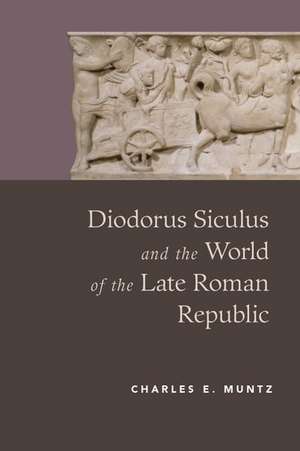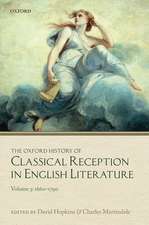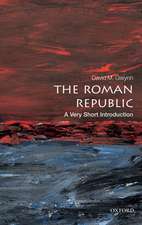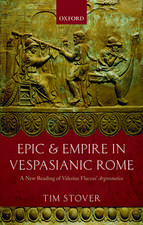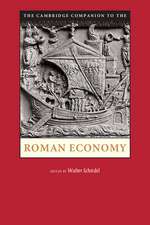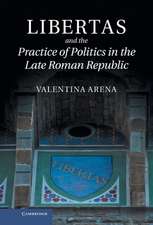Diodorus Siculus and the World of the Late Roman Republic
Autor Charles Muntzen Limba Engleză Hardback – 9 mar 2017
Preț: 598.84 lei
Preț vechi: 858.81 lei
-30% Nou
Puncte Express: 898
Preț estimativ în valută:
114.62€ • 119.21$ • 96.05£
114.62€ • 119.21$ • 96.05£
Carte tipărită la comandă
Livrare economică 03-10 martie
Preluare comenzi: 021 569.72.76
Specificații
ISBN-13: 9780190498726
ISBN-10: 0190498722
Pagini: 300
Dimensiuni: 160 x 239 x 31 mm
Greutate: 0.54 kg
Editura: Oxford University Press
Colecția OUP USA
Locul publicării:New York, United States
ISBN-10: 0190498722
Pagini: 300
Dimensiuni: 160 x 239 x 31 mm
Greutate: 0.54 kg
Editura: Oxford University Press
Colecția OUP USA
Locul publicării:New York, United States
Recenzii
In Diodorus Siculus and the World of the Late Roman Republic, Charles E. Muntz has demonstrated what should now be accepted: that this so-called 'mere copyist' possessed an original mind. Muntz provides by far the most complete attempt yet to locate Diodorus's sentiments and rhetorical strategies within a first century context. Closely and meticulously argued and richly documented, this is an essential contribution to Hellenistic historiography.
Overall, this is a successful challenge to those who still consider Diodorus a 'mindless compiler'. In Muntz's case, the revisionist approach is not a bulldozer with which to force an argument from unwilling evidence, but a can opener used carefully to pry the evidence open. ... the approach is sound, and his conclusions demand respect and-if one disagrees with them-counter-arguments.
This detailed reading of the first three books of Diodorus's Bibliotheke shows how even his presentation of non-Greek mythology and ethnography-the 'ancient barbarians' and their culture-bringers, mythical history, and deification of mortals-bears the stamp of the political and intellectual currents of the late Roman Republic. Muntz follows Diodorus from the origins of the world to the triumph and downfall of Julius Caesar, and he offers fascinating answers to questions surrounding Diodorus's composition and publication of his work. This will be a major contribution to the study of Diodorus, and of Greek historiography as a whole.
Muntz presents a worthy study, one that does justice to an author unjustly depreciated. His appropriately key themes-Diodorus' originality, his kinship with the intellectual world of Rome, and his use of accounts of barbarians to discuss contemporary issues-are voiced throughout the book, serving as the thread that connects all its chapters.
Unlike, say, a recent Ph.D.'s struggles to secure a tenure-track job, Diodorus' struggle for recognition (if such it was) surely remained insulated within the circles of wealthy Mediterranean elites. This consideration may well underscore how elusive the framing of an ancient historian's activity is, but it does not obviate Muntz's keen insights into an important Greek historian's intellectual significance.
Summing Up: Highly recommended. Graduate students/faculty.
Overall, this is a successful challenge to those who still consider Diodorus a 'mindless compiler'. In Muntz's case, the revisionist approach is not a bulldozer with which to force an argument from unwilling evidence, but a can opener used carefully to pry the evidence open. ... the approach is sound, and his conclusions demand respect and-if one disagrees with them-counter-arguments.
This detailed reading of the first three books of Diodorus's Bibliotheke shows how even his presentation of non-Greek mythology and ethnography-the 'ancient barbarians' and their culture-bringers, mythical history, and deification of mortals-bears the stamp of the political and intellectual currents of the late Roman Republic. Muntz follows Diodorus from the origins of the world to the triumph and downfall of Julius Caesar, and he offers fascinating answers to questions surrounding Diodorus's composition and publication of his work. This will be a major contribution to the study of Diodorus, and of Greek historiography as a whole.
Muntz presents a worthy study, one that does justice to an author unjustly depreciated. His appropriately key themes-Diodorus' originality, his kinship with the intellectual world of Rome, and his use of accounts of barbarians to discuss contemporary issues-are voiced throughout the book, serving as the thread that connects all its chapters.
Unlike, say, a recent Ph.D.'s struggles to secure a tenure-track job, Diodorus' struggle for recognition (if such it was) surely remained insulated within the circles of wealthy Mediterranean elites. This consideration may well underscore how elusive the framing of an ancient historian's activity is, but it does not obviate Muntz's keen insights into an important Greek historian's intellectual significance.
Summing Up: Highly recommended. Graduate students/faculty.
Notă biografică
Charles E. Muntz is Assistant Professor in the Department of History at the University of Arkansas and has been a visiting fellow at Wolfson College, Cambridge University. He received his Ph.D. from Duke University and his B.A. from Swarthmore College.
